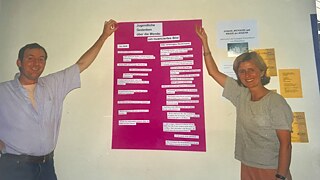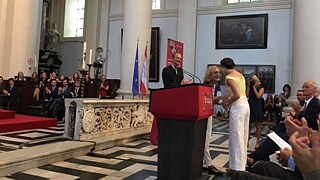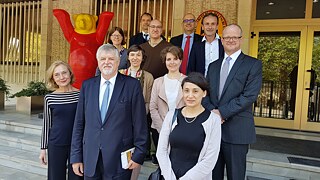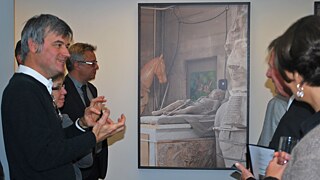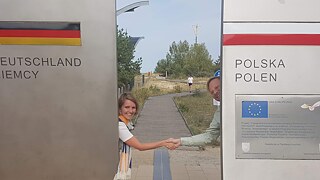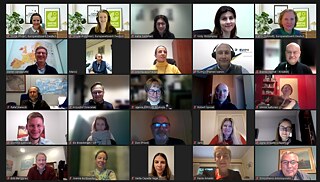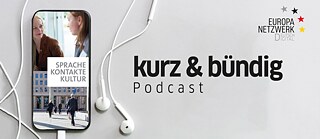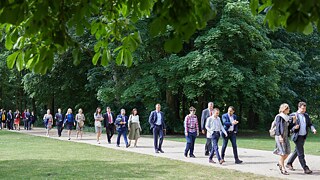EU course group in Pfalzgrafenweiler-Kälberbronn 1994 © Goethe-Institut, Markus Biechele & Alicia Padrós
1994
The first EU course in Germany
One of the first EU courses takes a group of EU officials to learn German to the small community of Pfalzgrafenweiler-Kälberbronn in Baden-Württemberg. Today, EU courses are held in major cities such as Berlin, Munich and Hamburg.
Excursion to the Czech Republic as part of the cross-border EU course Dresden-Prague 2022 © Goethe-Institut, Ludwig Nachtmann
2000
Expansion of the target group
In the context of the upcoming EU enlargement in 2004 to include ten Central and Eastern European countries, the target group of the Europanetzwerk Deutsch was already extended to include ministerial officials from the expected future EU member states in 2000.
Participants of Europanetzwerk Deutsch during the lessons © Bernhard Ludewig
2004
Introduction of individual and group courses
With the 10th anniversary of the program, further formats are introduced: tailor-made individual courses for high-ranking EU officials as well as group courses for ministerial officials from the permanent representations of the EU member states and journalists to support discourse between politics and media.
Discussion group 60 years of the European Investment Bank in the service of Europe 2018 © Goethe-Institut, Carmen Klein
2006
Start of networking activities in Brussels and Luxembourg
At discussion panels and regular receptions in Brussels and Luxembourg alumni, partners and interested people come together to discuss political, economic or cultural topics of current relevance to the EU or Germany with high-ranking personalities from the EU setting.
Visit to the Federal Chancellery, Alumni Meeting 2023 © Bernhard Ludewig
2007
First alumni meeting in Berlin
Since 2007, former participants have been invited to alumni meetings. There is great pleasure in seeing each other again and new contacts are made in exclusive meetings. In Berlin, a visit to the international WDR Europe Forum is one of the highlights of the reunion.
Weekend German course group in the Ardennes 2022 © Europanetzwerk Deutsch
2009
Introduction of the weekend German courses
With the aim of improving the German language skills of our alumni from the EU institutions in the shortest possible time, weekend German courses have been held in Belgium and Luxembourg since 2009.
Reading and discussion with Robert Menasse at the Representation of the State of Hesse to the EU 2023 © Eric Berghen
2010
Cooperation with the federal states
There has been close cooperation with the federal states in Germany on EU courses for many years. Since 2010, this cooperation has also been intensified with the state representations in Brussels. The close cooperation enables numerous exciting projects, such as the reading by Robert Menasse from his EU novel "The Enlargement" in 2023, which the Goethe-Institut organized together with the Representation of the State of Hesse.
Alumni meeting in Berlin 2014 © Bernhard Ludewig
2014
20 years Europanetzwerk Deutsch
The 20th anniversary of the Europanetzwerk Deutsch is celebrated with the production of an image film at the alumni meeting in Berlin. In addition, Klaus Kinkel, former Federal Foreign Minister and founder of the program, speaks at the event "More than 20 years Europanetzwerk Deutsch - what's next?" at the Permanent Representation of the Federal Republic of Germany to the EU in 2016.
25th anniversary in Brussels © Eric Berghen
2019
25 years of Language. Contacts. Culture.
The Europanetzwerk Deutsch celebrates its 25th anniversary with high-ranking guests from the EU institutions and alumni from numerous EU member states at the Representation of the State of Baden-Württemberg in Brussels. Participants discuss the role of the German language in Europe and their personal experiences in Germany in panel discussions.
Event at the European House in Berlin 2020 © Bernhard Ludewig
2020
Special project
Europa. Deine Sprachen.
On the occasion of the European Trio Presidency Germany-Portugal-Slovenia, the Europanetzwerk Deutsch examined the role of multilingualism in Europe. Under the title “Europa. Deine Sprachen.” various events took place under this topic in 2020 and 2021.
Event with Herlinde Koelbl in Brussels 2021 © Eric Berghen
2021
Guests of Europanetzwerk Deutsch ...
By inviting writers, artists and philosophers, Europanetzwerk Deutsch aims to represent the widest possible spectrum of Germany's cultural diversity. In addition to readings with relevant authors from German-speaking countries, our alumni were able to meet the German photographer Herlinde Koelbl live and in hybrid form in Brussels and view her work "Angela Merkel. Portraits 1991 - 2021" at first hand.
30 years Europanetzwerk Deutsch © Bernhard Ludewig
2024
30 years Europanetzwerk Deutsch
The motto of our anniversary year is "The Future of Europe". In addition to our popular formats, we will make 2024 to an outstanding year with special events.
